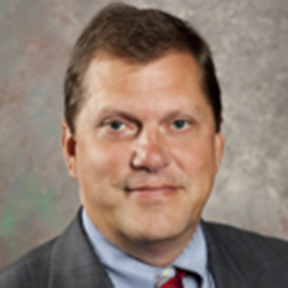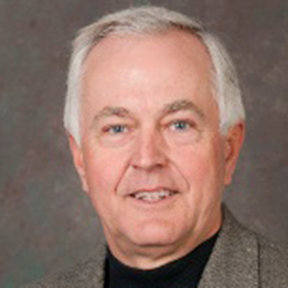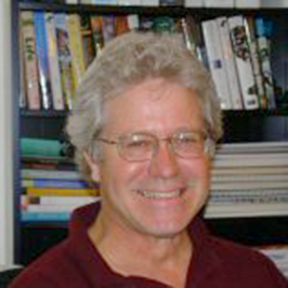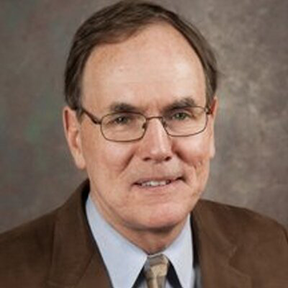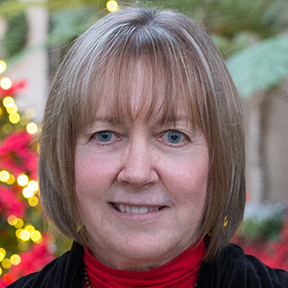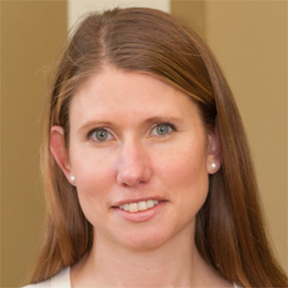Maintaining Institutional Momentum for Teaching Transformation
Date: January 6
Time: 8:30 – 9:30 a.m.
Location: Rodney Room, Perkins Student Center
Description: Physics Professor and Dean George Watson has been a leader of efforts to transform undergraduate instruction at UD since the early 1990s. He will speak about the challenges of maintaining momentum within classes and schools that hope to replace passive listening with active learning on the part of students.
George Watson, Dean, College of Arts & Sciences
Watson is the founding director of the Institute for Transforming Undergraduate Education, created at UD in 1997 with an NSF Institution-Wide Reform grant to promote transformation of undergraduate education through faculty development and course design. In 2001, Watson and the ITUE team launched the PBL Clearinghouse. In 2004, he co-founded the Pan-American Network for Problem-Based Learning. His work on engagement of students in their learning and transformation of undergraduate curricula has taken him to 20 countries for work with institutions of higher education and more than 30 institutions across the United States.
Watson’s two most recent course developments were a science and technology literacy course for non-science majors and an introductory electrical engineering course for sophomore mechanical engineering majors. His commitment to undergraduate education has been recognized with several teaching awards, including Outstanding Teacher in the College of Arts and Sciences in 2000 and Delaware Professor of the Year in 1998. Since 2010, Watson has served as Dean of the College of Arts & Sciences at the University of Delaware.
Experience It Yourself: The Student Experience in a PBL Classroom
Date: January 6
Time: 9:45 a.m. to 12:00 noon
Location: Rodney Room, Perkins Student Center
Description: Participate in a team-based problem-solving session, exemplifying best practices. Music professor Phil Duker will lead all participants in a problem suited to a general audience in a typical college-level music course. The best way to understand PBL is to experience it yourself!
Phil Duker, Associate Professor, Music
Philip Duker, Associate Professor, Music Theory joined the faculty at the University of Delaware in 2009. He is a former fellow at the University of Michigan’s Institute for the Humanities, an experience that broadened his interdisciplinary research interests. Many of his research interests lie at the intersection between music and the humanities, including instrumental theatre and the visual/bodily aspects of performance, rhythm and temporality, philosophy and aesthetics, critical theory and the relationship between performance and analysis.
What is PBL? An Overview
Date: January 6
Time: 1:00 – 2:00 p.m.
Location: Rodney Room, Perkins Student Center
Description: What do we mean when we say “PBL”? What is critical to success in PBL? What instructional goals do we meet through PBL? What are the shared features that characterize PBL?
Steve Bernhardt, English
Dr. Stephen A. Bernhardt holds the Andrew B. Kirkpatrick, Jr. Chair in Writing at the University of Delaware, from which position he promotes strong writing and communication skills across the university. He is the author of Writer’s Help, a new, Web-based reference handbook from Bedford/St. Martin’s. He teaches courses in scientific and technical communication, first year composition, computers and writing, and grammar and style. Dr. Bernhardt currently directs the Institute for Transforming Undergraduate Education (ITUE) at UD, a group of faculty who promote active, engaged learning through team, problem and project-based teaching, frequently with an emphasis on innovative technologies.
What Makes a Good Problem?
Date: January 6
Time: 1:30 to 2:00 p.m.
Location: Rodney Room, Perkins Student Center
Description: A primary activity of the PBL instructor is finding and creating good problems. What characterizes a good problem for a PBL classroom? What should we think about when we create and test our own problems?
Sue Groh, Chemistry & Biochemistry
Dr. Susan E. Groh is an associate professor in the Department of Chemistry and Biochemistry at the University of Delaware. As a co-founder of the Institute for the Transformation of Undergraduate Education at the University of Delaware, she has presented workshops promoting problem-based and active learning regularly since 1993. Together with Barbara Duch and Deborah Allen, she edited “The Power of Problem-Based Learning” (2001), a guide to using problem-based learning in undergraduate settings, and served as Editor-in-Chief of the PBL Clearinghouse, a repository for peer-reviewed PBL problems and supporting materials. Dr. Groh teaches general chemistry in the Honors program and has won numerous awards for her work with students, Including the University Excellence in Teaching and Excellence in Advising awards.
Dr. Stephen A. Bernhardt holds the Andrew B. Kirkpatrick, Jr. Chair in Writing at the University of Delaware, from which position he promotes strong writing and communication skills across the university. He is the author of Writer’s Help, a new, Web-based reference handbook from Bedford/St. Martin’s. He teaches courses in scientific and technical communication, first year composition, computers and writing, and grammar and style. Dr. Bernhardt currently directs the Institute for Transforming Undergraduate Education (ITUE) at UD, a group of faculty who promote active, engaged learning through team, problem and project-based teaching, frequently with an emphasis on innovative technologies.
Constructing a Well-Formed Problem
Date: January 6
Time: 2:00 to 4:00 p.m.
Location: Rodney Room, Perkins Student Center
Description: In an extended session with multiple facilitators, participants will create a new problem that might be used in one of their classes. Problem-writing activity will be followed up on Thursday with more time for constructing an engaging problem.
Richard Donham, Biological Sciences
Richard Donham holds a Ph.D. in Biology from the University of Washington and was Senior Science Education Associate for the Mathematics & Science Education Resource Center at the University of Delaware. The Center provides professional development for in-service teachers and serves as a coordinating unit for University efforts to assist science and math education in the state. For more than a decade, Richard has been involved in middle and high school science curricular development and implementation at the state level. He also collaborates with other faculty to provide graduate level courses that fortify middle school and high school teachers understanding of science so they can be more effective in the classroom. With a secondary position in the Department of Biological Sciences, Richard also taught biology to undergraduate elementary education majors and was a leader in the use of inquiry pedagogies, particularly problem-based learning (PBL).
Sue Groh, Chemistry & Biochemistry
Dr. Susan E. Groh is an associate professor in the Department of Chemistry and Biochemistry at the University of Delaware. As a co-founder of the Institute for the Transformation of Undergraduate Education at the University of Delaware, she has presented workshops promoting problem-based and active learning regularly since 1993. Together with Barbara Duch and Deborah Allen, she edited “The Power of Problem-Based Learning” (2001), a guide to using problem-based learning in undergraduate settings, and served as Editor-in-Chief of the PBL Clearinghouse, a repository for peer-reviewed PBL problems and supporting materials. Dr. Groh teaches general chemistry in the Honors program and has won numerous awards for her work with students, Including the University Excellence in Teaching and Excellence in Advising awards.
Group Dynamics in the PBL Classroom
Date: January 6
Time: 4:00- 5:00 p.m.
Location: Rodney Room, Perkins Student Center
Description: Most PBL models encourage team-based problem solving. But how do we structure teams and facilitate teams so they can be productive? What specific strategies will encourage strong team formation and performance?
Mark Serva, Accounting & MIS
Mark A. Serva is an associate professor of management information systems at the University of Delaware. His research focuses are trust in electronic commerce and latent growth modeling. He is the former director for the Institute for Transforming Undergraduate Education (ITUE) at the University of Delaware, a leading advocate for PBL and other student-centered pedagogies. He is the current program director for the global enterprise technology (GET) program, which places students in extended internships in area companies. The program allows students to make significant progress toward graduation, while also defraying the costs of higher education. The program has placed 100% of its students since its inception in 2010. Dr. Serva has also worked as an educational consultant for over ten years, conducting PBL workshops around the United States and the world for UD and Harvard University.
Poster Session and Welcoming Reception
Date: January 6
Time: 5:30 to 7:00 p.m.
Location: Atrium, Harker ISE Lab
We’re assembling an internationally diverse selection of poster presentations that will look at PBL and its variants from all angles. Please plan to circulate among all the poster locations as you enjoy the food and beverages that accompany the welcoming reception.
Designing Problem-Based Learning Environments According to the Principles of How People Learn
Date: January 7
Time: 8:30 – 9:30 a.m.
Location: Rodney Room, Perkins Student Center
Description:
How can we match our pedagogical approaches to the ways that our students learn best? Does learning psychology suggest certain approaches, certain ways of structuring our classrooms? And what about technology? How can technologies support active, engaged, problem-based learning?
Fred Hofstetter, School of Education
Dr. Fred Hofstetter serves as a professor in the School of Education at the University of Delaware. He develops eLearning software and designs and publishes curricular materials used in UD’s graduate programs and undergraduate minor in educational technology. His research interests include educational technology, instructional design, multimedia, distance learning, advanced Web design, higher education, and music education. Recently Dr. Hofstetter has focused on the iPad, for which he has developed the iSeeNcode app for the School of Education’s IES literacy grant, and he has published the iPad Primer, which is an ePub available in the Apple iBookstore. For more on Dr. Hofstetter’s work, follow this link to his vita.
Chrystalla Mouza, School of Education
Dr. Chrystalla Mouza is associate professor of Instructional Technology & Learning Sciences in the School of Education. She earned an Ed.D., M.Ed, and M.A. in Instructional Technology and Media from Teachers College, Columbia University and completed post-doctoral work at the Educational Testing Service (ETS). Her work focuses on teacher learning in the use of technology, applications of technology in K-12 classrooms, teaching and learning outcomes in ubiquitous and mobile computing environments. She is a principal investigator on several projects funded by the Delaware Department of Education to improve teacher quality in high-need schools, a co- PI on a National Science Foundation grant that provides teacher professional development in the area of computational thinking, and the learning scientist on two National Science Foundation funded projects that seek to improve climate science education by providing effective professional development to teachers. Her work has been published in key outlets and has been honored with 2010 Distinguished Research in Teacher Education Award from the Association of Teacher Educators.
Engaging Assessment: Matching Assessments with your Problem and Student Learning
Date: January 7
Time: 9:45 a.m. – 11:00 a.m.
Location: Rodney Room, Perkins Student Center
Description: In this hands-on session, together we will refine your student learning objectives and problem activities allowing you to develop a plan that (a) monitors students’ progress in and perceptions of the activities and (b) determines how well students are meeting the learning objectives.
Kevin Guidry, Center for Teaching and Assessment of Learning
Kevin R. Guidry is Senior Research Analyst at the UD Center for Teaching and Assessment of Learning. He works with faculty on exploring new pedagogies and improving existing teaching practices to enhance student learning. Guidry specializes in assessment of student learning and survey methodology having worked on teaching, learning, and assessment research and practice at levels ranging from individual courses to projects spanning hundreds of colleges and universities.
Kathy Pusecker, Center for Teaching and Assessment of Learning
Kathleen Langan Pusecker is the Director of Educational Assessment at the University of Delaware. She establishes and maintains relationships with faculty members, Chairs, Deans, and other senior internal constituencies and external agencies, to include national accreditation bodies. She also serves on the Faculty Senate General Education Committee that passed new goals in November 2014. Her responsibilities include assisting UD in addressing the Middle States Commission on Higher Education accreditation standards related to the assessment of general education and student learning. She helps to select and develop tools and oversees their implementation and the analysis and reporting of data. Pusecker establishes critical communications and coordination with internal constituencies and University senior decision-makers to address issues that may affect execution/implementation of University strategic plans, policies and programs. In addition, Pusecker publishes the reports of student learning outcomes for the College Portrait.
Integrating Communication Skills as an Outcome of PBL
Date: January 7
Time: 11:00 a.m. to 12:00 noon
Location: Rodney Room, Perkins Student Center
Description: The PBL classroom offers a great setting for integrating communication skills (oral, written, team, electronic) with content objectives. How can we best support students as they develop these key competencies, sometimes referred to as “soft” skills? Can we design problems to foster the development of communication skills?
Steve Bernhardt, English
Dr. Stephen A. Bernhardt holds the Andrew B. Kirkpatrick, Jr. Chair in Writing at the University of Delaware, from which position he promotes strong writing and communication skills across the university. He is the author of Writer’s Help, a new, Web-based reference handbook from Bedford/St. Martin’s. He teaches courses in scientific and technical communication, first year composition, computers and writing, and grammar and style. Dr. Bernhardt currently directs the Institute for Transforming Undergraduate Education (ITUE) at UD, a group of faculty who promote active, engaged learning through team, problem and project-based teaching, frequently with an emphasis on innovative technologies.
Models of PBL: Pure, Hybrid, Large, Small
Date: January 7
Time: 1:00 – 2:00 p.m.
Location: Rodney Room, Perkins Student Center
Description: There is no single approved approach to PBL. Rather, teachers look at their classes, classrooms, and students, and they choose a given approach. Better yet, they experiment with a given approach and fine-tune their methods as they and their students become more successful. What are some ways that PBL has been approached in various classrooms? We will tap into the experience of our participants and facilitators to describe multiple models of PBL.
Deborah Allen, Biological Sciences
Deborah Allen is a professor of biological sciences at the University of Delaware (UD), and former program officer in the National Science Foundation’s Division of Undergraduate Education. In the mid-1990s, Allen joined a multidisciplinary team of educators to design, implement, and assess problem-based learning (PBL) curricula for introductory courses, including interdisciplinary ones for pre-service teachers. Allen is a founding member of the editorial board of CBE-Life Sciences Education and has authored feature articles for the journal since 2002. She is co-author/editor of several books on PBL and related instructional strategies, and is an advisor to a number of PBL-related federally funded projects. Allen is a recipient of UD’s Excellence in Teaching Award and of the American Society for Cell Biology’s 2013 Bruce Alberts Award for Excellence in Science Education, and has served as a Fulbright Senior Specialist in Péru to co-develop a PBL program for middle school environmental science.
Advanced Problem Writing
Date: January 7
Time: 2:15 – 4:00 p.m.
Location: Rodney Room, Perkins Student Center
Description: A continuation of problem-writing activities, in consultation with multiple facilitators and participants from cognate disciplines. All participants are welcome.
Deborah Allen, Biological Sciences
Deborah Allen is a professor of biological sciences at the University of Delaware (UD), and former program officer in the National Science Foundation’s Division of Undergraduate Education. In the mid-1990s, Allen joined a multidisciplinary team of educators to design, implement, and assess problem-based learning (PBL) curricula for introductory courses, including interdisciplinary ones for pre-service teachers. Allen is a founding member of the editorial board of CBE-Life Sciences Education and has authored feature articles for the journal since 2002. She is co-author/editor of several books on PBL and related instructional strategies, and is an advisor to a number of PBL-related federally funded projects. Allen is a recipient of UD’s Excellence in Teaching Award and of the American Society for Cell Biology’s 2013 Bruce Alberts Award for Excellence in Science Education, and has served as a Fulbright Senior Specialist in Péru to co-develop a PBL program for middle school environmental science.
Richard Donham, Biological Sciences
Richard Donham holds a Ph.D. in Biology from the University of Washington and was Senior Science Education Associate for the Mathematics & Science Education Resource Center at the University of Delaware. The Center provides professional development for in-service teachers and serves as a coordinating unit for University efforts to assist science and math education in the state. For more than a decade, Richard has been involved in middle and high school science curricular development and implementation at the state level. He also collaborates with other faculty to provide graduate level courses that fortify middle school and high school teachers understanding of science so they can be more effective in the classroom. With a secondary position in the Department of Biological Sciences, Richard also taught biology to undergraduate elementary education majors and was a leader in the use of inquiry pedagogies, particularly problem-based learning (PBL).
Sue Groh, Chemistry & Biochemistry
Dr. Susan E. Groh is an associate professor in the Department of Chemistry and Biochemistry at the University of Delaware. As a co-founder of the Institute for the Transformation of Undergraduate Education at the University of Delaware, she has presented workshops promoting problem-based and active learning regularly since 1993. Together with Barbara Duch and Deborah Allen, she edited “The Power of Problem-Based Learning” (2001), a guide to using problem-based learning in undergraduate settings, and served as Editor-in-Chief of the PBL Clearinghouse, a repository for peer-reviewed PBL problems and supporting materials. Dr. Groh teaches general chemistry in the Honors program and has won numerous awards for her work with students, Including the University Excellence in Teaching and Excellence in Advising awards.
Solving the Problems of PBL (Panel)
Date: January 7
Time: 4:15 – 5:00 p.m.
Location: Rodney Room, Perkins Student Center
Description: An experienced team of ITUE/PBL leaders will lead a question/answer discussion of how to address issues related to PBL: managing groups, assessing learning, working with large classes, using distance technologies, designing problems, assigning grades, meeting content goals. If you have a question, the panelists will try to address it.
Panelists:
Deborah Allen, Biological Sciences
Steve Bernhardt, English
Richard Donham, Biological Sciences
Phil Duker, Music
Sue Groh, Chemistry & Biochemistry
Jeanne Narum, Learning Spaces Collaboratory | Project Kaleidoscope (PKAL)
Mark Serva, Accounting & MIS
Hal White, Chemistry & Biochemistry
Classroom Ecologies: How Learning Spaces Support Different Pedagogies
Date: January 8
Time: 8:30 – 9:30 a.m.
Location: Rodney Room, Perkins Student Center
Description: This session will explore the intersection of learning space design and active learning principles. Bringing together experiences from the Learning Space Consortium (LSC) and the University of Delaware (UD), participants will consider design principles in light of several classroom construction case studies. Participants will discuss how to take advantage of the increasing variety of classrooms built specifically to support active, team-based and problem-based learning. In this general session, participants will take a virtual tour of those spaces, all intended to support the social and technological aspects of learning.
Paul Hyde, Academic Technology Services
Paul Hyde, Academic Technology Services at the University of Delaware, works at the intersection of teaching and technology. He has helped lead several initiatives involving education and technology, including the formation of UD’s first teaching and technology center, the Faculty Institute program, the Student Multimedia Design Center, and Faculty Commons. He has taught for the School of Education, the Department of Art, and Professional and Continuing Studies and received UD’s Award for Excellence in Teaching Adult Students. He presents widely on active learning and learning space design.
Jeanne Narum, Learning Spaces Collaboratory | Project Kaleidoscope (PKAL)
As founding principal of the Learning Spaces Collaboratory (LSC), since 2010 Jeanne Narum’s professional focus is on promoting best practices in visioning, planning, and assessing physical spaces serving 21st century undergraduate learners and learning communities. From 1989 – 2010, Narum was Director of Project Kaleidoscope (PKAL), an NSF-funded initiative to catalyze transformation of undergraduate STEM learning environments. From 2003 – 2009, with support from NITLE, Narum facilitated workshops focusing on planning technology-enhanced spaces, including information commons and classrooms. She has had leadership responsibility for over 100 PKAL/LSC facilities-related activities designed to advance awareness of how space matters to learning and of planning strategies to realize that spaces matter for a particular community.
Peer Mentoring and PBL
Date: January 8
Time: 9:45 – 11:15 a.m.
Location: Rodney Room, Perkins Student Center
Description: What are some models of peer and near-peer learning in PBL classrooms? How does PBL extend opportunities for various mentoring relationships? Can peer facilitators help manage PBL in large classes? How can we train and support peer tutors in PBL classrooms? Can faculty mentor other faculty in approaches to PBL?
Catherine Grimes, Chemistry & Biochemistry
Dr. Catherine Leimkuhler Grimes is an assistant professor in Department of Chemistry and Biochemistry at the University of Delaware. Prior to her time at UD, she assisted in the design and implementation of an introduction life science class and laboratory at Harvard University. Her research laboratory at UD focuses on using tools from chemical biology to understand how the human body interacts with bacteria (both commensal and pathogenic). She has uses these topics as inspiration for a Problem Based Learning (PBL) Biochemistry class that she developed at UD under the mentorship of her award winning colleague, Professor Hal White. She is a Pew Biomedical Scholar and more recently the Research Corporation named her as Cottrell Scholar for which she will receive funding for development of a PBL bio-organic laboratory for sophomore biochemistry majors.
Hal White, Chemistry & Biochemistry
Hal White joined the University of Delaware Department of Chemistry and Biochemistry in 1971. Between 1994 and 1998, he served as Principal Investigator on the first NSF/DUE grant on Problem-Based Learning (PBL) to the University of Delaware and was involved with subsequent NSF, FIPSE, and Pew Charitable Trusts grants for PBL. Currently he is an associate editor for Biochemistry and Molecular Biology Education where he writes commentaries on PBL. Hal has received numerous teaching awards including the 2011 Howard Barrows award for exceptional teaching from McMaster University, the 2013 CASE-Carnegie Foundation Delaware Professor of the Year, and the 2014 American Society for Biochemistry and Molecular Biology’s Award for Exemplary Contributions to Education.
Active Learning in the xBL Classroom: The Student Experience
Date: January 8
Time: 11:15 – 12:15 p.m.
Location: Rodney Room, Perkins Student Center
Description: A panel of students will offer their perspectives on PBL in a variety of disciplines: What do they learn? How do teams function? Who provides leadership? What can be done about loafers? How do peer tutors work most effectively? We will provide time for questions and answers from student experts.
Sarah Morales, Landscape Design
Priyha Mahesh, Honors integrated Biology Chemistry (HiBC) workshop co-coordinator
Tyler Heiss, Biochem
Sarah Kriebel, former SCEN101 student in ISE Lab, also serving as studio fellow
Pavani Vemuri, graduate assistant in Faculty Commons
Sarah Hartman, project manager with the Philippines team and incoming president, Engineers Without Borders – University of Delaware.
Dina Collins, Honors integrated Biology Chemistry (HiBC) workshop co-coordinator
Paul Hyde, moderator
Concept Mapping and the PBL Classroom
Date: January 8
Time: 1:00 – 2:15 p.m.
Location: Rodney Room, Perkins Student Center
Description: In this general session, participants will use concept mapping (or mind mapping) to create a model of their current understanding of PBL and its components. Concept mapping will be discussed as a way to reflect on learning, to assess current and prior understanding, and as a means of outcomes assessment in both group and individual contexts.
Hal White, Chemistry & Biochemistry
Hal White joined the University of Delaware Department of Chemistry and Biochemistry in 1971. Between 1994 and 1998, he served as Principal Investigator on the first NSF/DUE grant on Problem-Based Learning (PBL) to the University of Delaware and was involved with subsequent NSF, FIPSE, and Pew Charitable Trusts grants for PBL. Currently he is an associate editor for Biochemistry and Molecular Biology Education where he writes commentaries on PBL. Hal has received numerous teaching awards including the 2011 Howard Barrows award for exceptional teaching from McMaster University, the 2013 CASE-Carnegie Foundation Delaware Professor of the Year, and the 2014 American Society for Biochemistry and Molecular Biology’s Award for Exemplary Contributions to Education.
Jackie Fajardo, Chemistry & Biochemistry
My work centers on the CHEM103/104 General Chemistry series. The traditional version of these courses comprise of science and engineering students who do not have a major emphasis in chemistry or chemical engineering, yet require a strong foundation in chemistry on which to build upon. I strive to foster a continuous learning environment so that, through their experiences in lecture, laboratory, workshop, and unscheduled time in between, our students are immersed in the study of chemistry. This immersion requires careful implementation and utilization of numerous instructional and technological resources available here at UDel. To access my students’ unscheduled time, all of my course lectures, both in-class and supplemental, are posted directly to our course site. Supplemental recorded lectures give me the freedom to spend our precious lecture time engaging in dialogue with the students, developing ideas, queries, and furthering our collective insights. Methods of simple problem solving, such as techniques associated with dimensional analysis, are addressed through supplemental lectures that may be viewed by the students at their own convenience, and applied during lecture.
Mad Minute: Best Ideas, Best Practices, Takeaways
Date: January 8
Time: 2:15 – 3:00 p.m.
Location: Rodney Room, Perkins Student Center
Description: This fun and fast-paced session is a chance for participants to share their best takeaway idea. You’ll also hear from the facilitators with their parting words of wisdom and their recommended resources for your continued exploration of problem-based learning. Be prepared to offer your own mad minute to the mix!
[Optional post-conference session] Walking Tour of Campus Learning Spaces
Walking tour of campus learning spaces, will begin at the end of the Mad Minute session, starting out from the Rodney Room, Perkins Student Center. Stops along the tour will include Harker ISE Lab classrooms and informal learning spaces, Faculty Commons (Pearson Hall), Design Studio (Spencer Lab), 218 Gore Hall classroom, 110 Memorial Hall classroom, and the Student Multimedia Design Center.
Limited to the first 30 participants who sign up at the registration table or through this web form.

